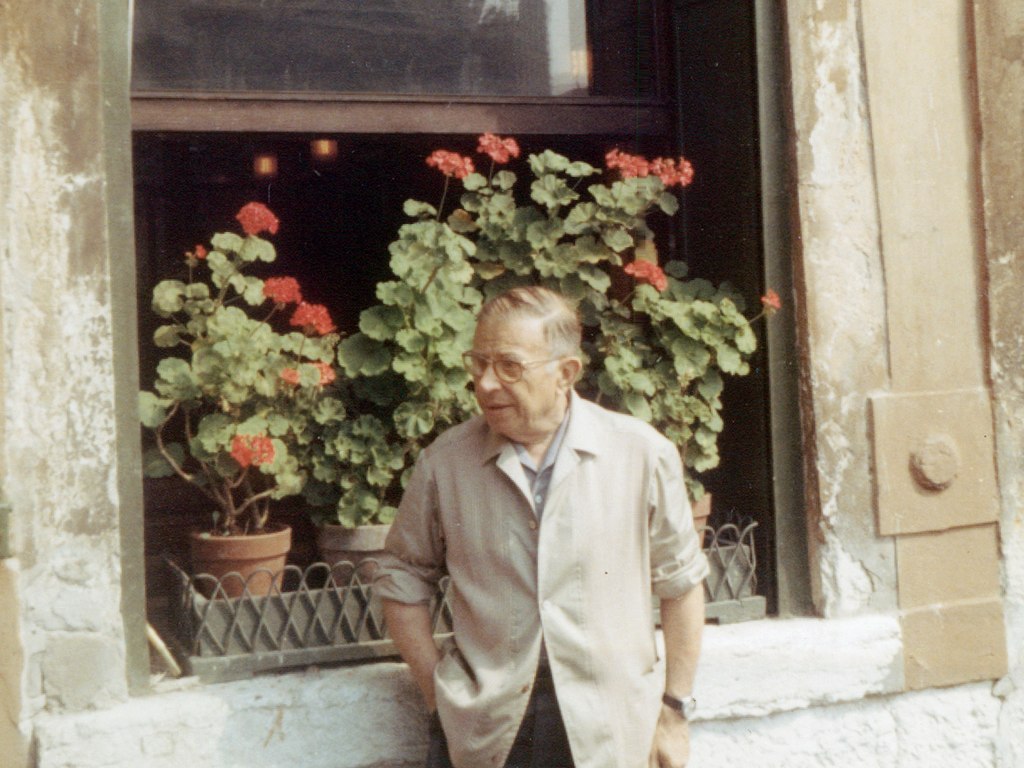
FROM WIKIPEDIA COMMONS
Jean-Paul Charles Aymard Sartre (/ˈsɑːrtrə/, US also /ˈsɑːrt/; French: [saʁtʁ]; 21 June 1905 – 15 April 1980) was a French philosopher, playwright, novelist, screenwriter, political activist, biographer, and literary critic. He was one of the key figures in the philosophy of existentialism and phenomenology, and one of the leading figures in 20th-century French philosophy and Marxism. His work has also influenced sociology, critical theory, post-colonial theory, and literary studies, and continues to influence these disciplines.
Sartre was also noted for his open relationship with prominent feminist and fellow existentialist philosopher and writer Simone de Beauvoir. Together, Sartre and de Beauvoir challenged the cultural and social assumptions and expectations of their upbringings, which they considered bourgeois, in both lifestyles and thought. The conflict between oppressive, spiritually destructive conformity (mauvaise foi, literally, ‘bad faith‘) and an “authentic” way of “being” became the dominant theme of Sartre’s early work, a theme embodied in his principal philosophical work Being and Nothingness (L’Être et le Néant, 1943). Sartre’s introduction to his philosophy is his work Existentialism Is a Humanism (L’existentialisme est un humanisme, 1946), originally presented as a lecture.
He was awarded the 1964 Nobel Prize in Literature despite attempting to refuse it, saying that he always declined official honors and that “a writer should not allow himself to be turned into an institution.”
TODAY’S ALMANAC
1560s
1740s
1790s
1840s
1880s
- BORN 1882: N. C. WYETH (ILLUSTRATOR)
- 1883: NEW YORK’S ORIGINAL METROPOLITAN OPERA HOUSE OPENED WITH A PERFORMANCE OF CHARLES GOUNOD’S FAUST
- 1883: FIRST NATIONAL HORSE SHOW OPENED IN NEW YORK CITY
- BORN 1887: JOHN REED (JOURNALIST)
1900s
1910s
1920s
1930s
- BORN 1933: DONALD H. PETERSON (ASTRONAUT)
- DIED 1934: PRETTY BOY FLOYD (GANGSTER)
- 1938: CHESTER CARLSON PRODUCED THE FIRST XEROGRAPHIC COPY
- BORN 1938: CHRISTOPHER LLOYD (ACTOR)
- BORN 1939: TONY ROBERTS (ACTOR)
1940s
- 1940: PERCY L. JULIAN, EDWIN W. MEYER, AND NORMAN C. KRAUSE RECEIVED PATENT FOR CORTISONE
- BORN 1942: ANNETTE FUNICELLO (ACTRESS)
- BORN 1943: CATHERINE DENEUVE (ACTRESS)
1950s
- BORN 1952: JEFF GOLDBLUM (ACTOR)
- 1958: MARGARET MEAGHER BECAME CANADA’S FIRST FEMALE AMBASSADOR (TO ISRAEL)
1960s
- BORN 1963: BRIAN BOITANO (FIGURE SKATER)
- 1964: JEAN-PAUL SARTRE, FRENCH WRITER AND PHILOSOPHER, REJECTED THE NOBEL PRIZE FOR LITERATURE
1970s
1990s
- BORN 1990: JONATHAN LIPNICKI (ACTOR)
- 1997: THE KWANZAA U.S. POSTAGE STAMP WAS FIRST ISSUED; SYNTHIA SAINT JAMES DID THE ARTWORK.
2000s
- DIED 2002: RICHARD HELMS (HEADED THE CIA FOR 6 YEARS BEFORE PRESIDENT NIXON FIRED HIM FOR REFUSING TO BLOCK AN FBI PROBE INTO THE WATERGATE SCANDAL)
- DIED 2009: SOUPY SALES (AMERICAN COMEDIAN, ACTOR, RADIO-TV PERSONALITY AND HOST, AND JAZZ AFICIONADO)
2010s
COURTESY www.almanac.com

Appreciate it for helping out, wonderful info. “Riches cover a multitude of woes.” by Menander.